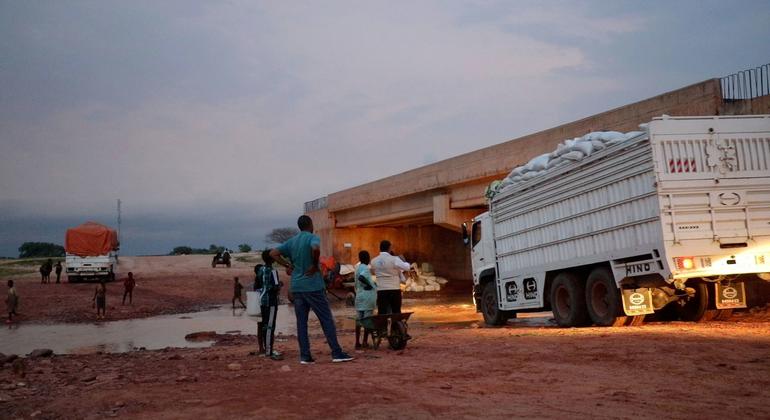World news in brief: Sudan aid breakthrough, rights in Afghanistan, Myanmar displacement continues


World Food Programme (World Food Programme) Trucks carrying sorghum, beans, oil and rice destined for 13,000 people at risk of starvation in Kereneik, West Darfur, crossed the border on Tuesday evening local time.
WFP reports that they have enough food and nutrition for about 500,000 people, ready to move quickly through this newly reopened route.
“The reopening of the Adre crossing is critical to preventing widespread famine across Sudan and must now continue to be used,” said WFP Executive Director Cindy McCain.
The race to avoid famine
“I want to acknowledge all parties who have taken this important step to help WFP deliver life-saving aid to millions of people in dire need.”
She said agencies urgently needed to reach every corner of Sudan with food aid through humanitarian corridors as well as border crossings: “This is the only way to avoid widespread famine.”
The Adre route from Chad is the most efficient and shortest route to deliver humanitarian aid into Sudan – and particularly the Darfur region – at the scale and speed needed to respond to the severe famine crisis.
Since Adre officially closed in February, WFP has only been able to operate two convoys through the Adre crossing – one in March and one in April – and since then, demand has increased as rival military forces vie for control of the devastated country.
UN expert pledges to protect Afghan human rights after entry ban
The UN’s independent human rights expert in Afghanistan has expressed concern about the Taliban’s commitment to ending repression of basic rights there, following the group’s announcement that it would not allow him to enter the country.
Special Rapporteur, Richard Bennettsaid he has always cooperated transparently with the authorities on the ground and effectively in assessing the country’s human rights situation and making recommendations for improvement where necessary.
“As an independent expert appointed by the United Nations, I take my responsibilities very seriously,” Mr. Bennett said. “I call on the Taliban to reverse their decision and reaffirm my willingness and ability to go to Afghanistan.”
Commitment to the people
The UN expert said he would continue to engage with the Afghan people “both at home and abroad, as well as other stakeholders,” noting that he had not been to Afghanistan for over a year.
Mr. Bennett also pledged to continue documenting human rights violations and making recommendations for improvement.
“I remain committed to the people of Afghanistan and to a stable, inclusive and prosperous country at peace with itself and its neighbors,” he said.
Special Rapporteurs are appointed by Human Rights Council to serve in their individual capacities, independent of the United Nations system and national governments. They are not employees of the United Nations and receive no salary.
Displacement is widespread across Myanmar
A UN spokesman warned on Wednesday that the deteriorating situation in three regions of Myanmar where fighting between military government forces and opposition rebels is intensifying is fueling displacement.
“The reports we are receiving indicate that the escalating hostilities in Rakhine have resulted in casualties and new waves of displacement, particularly in Maungdaw township, on the border with Bangladesh,” said Stéphane Dujarric.
An estimated 20,000 people were displaced from three central Maungdaw areas on August 5 while many more are now fleeing across the border.
In northern Shan state, fighting has resumed since late June, with an estimated 33,000 people displaced from four towns, he added.
“There are also reports of civilian casualties; houses and other structures have also been destroyed according to the information we have received.”
Funding is lacking
Heavy monsoon rains since late June are exacerbating an already dire humanitarian situation with some 393,000 people affected.
The 2024 Humanitarian Needs and Response Plan, which aims to reach some 5.3 million people across the country, has received only 23 percent of its requested funds – more than $225 million.
“Despite the challenges, some 2.1 million people across Myanmar were reached by the United Nations and other humanitarian partners in the first half of this year. They received assistance such as food, health, nutrition, water and sanitation support,” Mr. Dujarric concluded.




